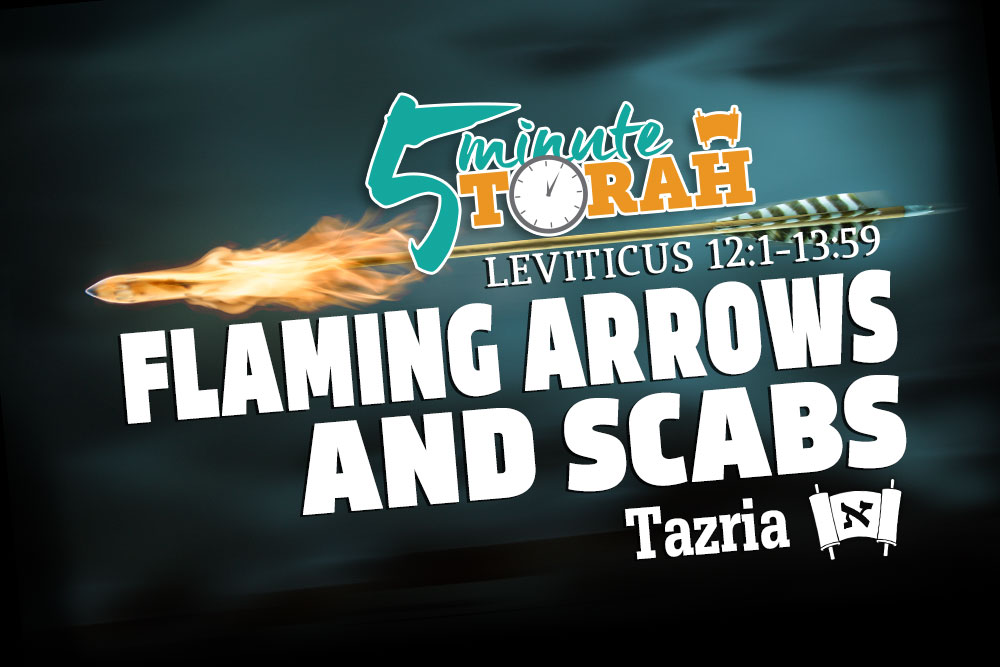Flaming Arrows & Scabs
Series:

Parashat Tazria (Leviticus 12:1-13:59)
In Parashat Tazria we are introduced to a skin disease of biblical proportions called tzara’at. Most people know it as biblical leprosy. However, as we mentioned in our previous commentary on this portion, it is completely unrelated to what we now know as leprosy. Tzara’at is a malady that affects not only the skin, but can also affect clothing, and the walls of a person’s home. It could begin as a moldy looking spot on a person’s house and end up as scab-looking blotches on his skin. As we discovered, the primary way tzara’at was contracted was through lashon hara (evil speech). A person who continually gossiped and spoke destructive words about others would eventually become afflicted with this disease.
With this in mind, studying the laws of tzara’at is an opportunity to remind ourselves of the damages of speaking ill of other people and how important it is for us to guard our tongues. Too often we forget about destructive nature and the severe damages lashon hara can inflict. The Talmud says that lashon hara kills three people: the speaker, the listener, and the one who is spoken of (Arachin 15b). How so? It kills the person speaking because it damages their reputation. They become known as someone who is malicious and uses information to harm others. It kills the listener because it alters the way they perceive other people. It kills the one spoken of because it damages their reputation.
The prophet Jeremiah compares the tongue to an arrow, saying, “Their tongue is a deadly arrow; it speaks deceitfully” (Jeremiah 9:8). Why? Unlike a sword, an arrow can can be deadly even at a distance. A person does not need to be in close proximity to be wounded by arrows. They merely have to be it the path of the flying object. But an arrow has range limitations. It can only travel so far. The tongue (i.e. lashon hara), however, has no limits on distance. It can travel around the world and pierce an unsuspecting heart without any effort at all.
The Midrash on Psalms compares lashon hara to an arrow because of its irreversible consequences. A person who unsheathes a sword can regret his intention and return it to its sheath. But the arrow cannot be retrieved. A fire is similar in this regard. Once an object is ablaze it can’t return to its original state. Another characteristic of fire is that it can spread to unintended places and do an insurmountable amount of damages. James, the brother of our Master, uses this analogy to describe the effects of lashon hara:
The tongue is a small member, yet it boasts of great things. How great a forest is set ablaze by such a small fire! And the tongue is a fire, a world of unrighteousness. The tongue is set among our members, staining the whole body, setting on fire the entire course of life, and set on fire by hell. (James 3:5–6)
We must also remember that lashon hara isn’t just slander or speaking lies about someone. Our speech can be considered lashon hara even if it’s true. It’s easy to criticize and backbite and think we are just relaying “the facts.” However, we shouldn’t even consider speaking negatively about anyone unless it is vital to the protection of someone else.
Yeshua takes this seriously. He told his disciples that careless words carry a heavy price and that we should be on our guard against loose lips at all times:
I tell you, on the day of judgment people will give account for every careless word they speak, for by your words you will be justified, and by your words you will be condemned. (Matthew 12:36–37)
Parashat Tazria isn’t merely about scabs and ritual impurity. It can also teach us about how we speak of others. The next time you are tempted to speak something negative against someone, remember that you are about to launch a flaming arrow that will land much farther away than you anticipated, and wound more people than you intended. And once it lands, the fire will spread and consume both the innocent and guilty alike. Why not extinguish that arrow and put it back in the quiver? It’s much safer for everyone.








